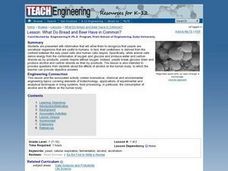Curated OER
Non-Fiction Read-aloud
Students listen to the reading of a book about the area of science they are currently studying.
Curated OER
Lung Limit
Students determine their lung capacity by completing a science experiment with a bottle of water. In this lung science lesson, students discuss the lungs' purpose. Students complete an experiment to determine their lung capacity using a...
Curated OER
Water Cycle in a Bottle
Students study the water cycle. For this water science lesson, students complete a water cycle experiment using soda bottles.
Curated OER
Graphing Data - Temperature
Seventh graders measure and record temperature over a given time period. They compare the recorded temperatures to the 40-year recorded normal average temperatures for the same area. Students display and interpret their findings in a graph.
Curated OER
Water Taste Test
Young scholars brainstorm the different characteristics of potable water. In this general science lesson plan, students test several water samples and hypothesize which samples and brands they are. They discuss where drinking water came...
Curated OER
People of the Cassini Team
Learners discuss the job qualifications of a team member for a space mission. In this space science lesson, students select a mentor from the Cassini team members and explain the reason for their selection. They assess the importance of...
Curated OER
Physical and Chemical Changes
Sixth graders complete several experiments about chemical and physical changes. In this physical and chemical science lesson, 6th graders complete 6 experiments about chemical and physical changes. Students examine the processes of...
Curated OER
The "Coal LIfecycle" Scrapbook
Students discover how coal is formed. In this science lesson plan, students create a scrapbook on the life cycle of coal and show how coal is formed by showing pictures of each stage.
Curated OER
How Does Climate Change?
In this climate worksheet, students will brainstorm 4 changes that can occur in the climate of an area. Then students will write in the effect these climate changes can have. This worksheet is a graphic organizer.
Curated OER
Maggie's Adventures Grades 3-5
Young scholars, while in the computer lab, utilize technology to practice math, science, Spanish and grammar skills. They build on math skills and attempt to improve their grammar skills as well as make connections between English and...
Curated OER
Science: Reading a Compass
Learners demonstrate how to take bearings using a compass. In pairs, they select objects in the classroom then write down its first initial and bearing. They exchange papers and try to disciver their partner's object.
Curated OER
Science: Comparing Beer and Bread
Students compare and contrast cellular respiration in yeast and plant and animal cells. After discovering the role of yeast in making beer and bread, they describe the short and long term effects of alcohol on the nervous and digestive...
Education Development Center
Finding Triangle Vertices
Where in the world (or at least in the coordinate plane) is the third vertex? Given two coordinate points for the vertices of a triangle, individuals find the location of the third vertex. They read an account of fictional...
Teach Engineering
Chromatography Lab
Groups use alcohol and chromatography paper to separate the color components of black ink. The purpose of the activity is to allow the class to become aware that mixtures exist in hidden places.
Teach Engineering
Edible Rovers (High School)
Design and build a rover ... then eat it? This activity has groups of two design and build Mars rovers. The teams determine what instruments they want to include with their rover and plan a budget. They calculate the cost of the body of...
Teach Engineering
Exploring Acceleration with an Android
Small groups use rubber bands to accelerate an Android device along a track of books. They collect the acceleration data and analyze it in order to determine the device's velocity.
Teach Engineering
Above-Ground Storage Tanks in the Houston Ship Channel
Introduce your class to storage tank failures caused by major storms with an activity that looks at how the concepts of Archimedes' Principle and Pascal's Law affect the storage tanks along the Houston Ship Channel. The background...
Teach Engineering
Start Networking!
Class members create their own social networks by collecting signatures before graphing the interactions with their fellow classmates. The degree distribution of the simulated social network is determined by calculating the degree of...
Teach Engineering
Linking Sources and Pollutants
Class members use an air quality monitor to measure the amount of gas-phase pollutants emitted by different sources. Groups choose three different sources and make predictions about what the monitors will detect. Teams then expose the...
Teach Engineering
Thinking Green!
Encourage your class to solve local environmental issues. Groups brainstorm environmental issues that are affecting the community, choose one they want to solve, and design a product or service to solve their chosen issue. They then...
Teach Engineering
Water Remediation Lab
Water filtration — that's pure genius! Groups test the ability of a water filter to purify water by running chlorine contaminated water through a filter and measuring the chlorine concentrations as they filter the water. They then graph...
Hood River County School District
Text Structure: Features and Organization
Teach learners how to interact with both fiction and non-fiction text with a packet of activities and worksheets. After looking over text structure and the difference in text features between different types of writing, readers analyze...
Teach Engineering
Storing Android Accelerometer Data: App Design
There's an app for that! Pupils learn to build an app that will store data on an Android. The instructional activity introduces class members to the tiny database, TinyDB, for Android devices. A video tutorial provides an example that...
Teach Engineering
Where Are the Plastics Near Me? (Mapping the Data)
The last activity in a nine-part series has teams create a Google Earth map using the data they collected during a field trip. Using the map, groups analyze the results and make adjustments to the map to reflect their analysis. A short...

























